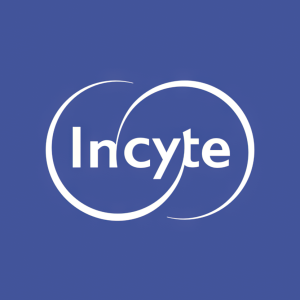Incyte Late-Breaking Tafasitamab (Monjuvi®) Data at ASH 2024 Demonstrate Significantly Improved Progression-Free Survival in Patients with Relapsed or Refractory Follicular Lymphoma
- The pivotal Phase 3 inMIND trial met its primary endpoint of progression-free survival (PFS) and key secondary endpoints in patients with relapsed or refractory follicular lymphoma (FL) treated with tafasitamab (Monjuvi®) in combination with lenalidomide and rituximab
-
Positive data featured in a late-breaking oral presentation at the 2024 American Society of Hematology (ASH) Annual Meeting support the planned
U.S. filing of a supplemental Biologics License Application (sBLA) for tafasitamab in FL by year-end 2024 - Incyte to host virtual analyst and investor event on Thursday, December 12, 2024, from 4:00-5:00 p.m. ET to discuss key data presented at ASH
The late-breaking results, which build on previously announced topline data, show that the study met its primary endpoint by demonstrating a statistically significant and clinically meaningful improvement in progression-free survival (PFS) by investigator assessment in 548 patients with FL. Patients treated with tafasitamab achieved a median PFS by investigator assessment of 22.4 months compared to 13.9 months in the control arm (Hazard Ratio [HR]: 0.43;
“In the Phase 3 inMIND trial, tafasitamab demonstrated impressive efficacy and safety for treating certain patients with follicular lymphoma, the most common type of B-cell non-Hodgkin lymphoma,” said Steven Stein, M.D., Chief Medical Officer, Incyte. “These data, the first to evaluate the novel approach of combining CD19 and CD20 immunotherapies, show the potential of tafasitamab in combination with lenalidomide and rituximab to become a new standard of care for these patients. We look forward to working with regulatory authorities to potentially bring this treatment forward to patients with FL.”
The trial also showed improvement across secondary endpoints, including:
-
Complete response (CR), overall response rate (ORR) and duration of response (DOR) each showed improvement in the tafasitamab group versus the control arm (CR of
49.4% vs.39.8% [95% CI (43.1, 55.8) and (33.7, 46.1), respectively; OR=1.5, P=0.0286); (ORR of83.5% vs.72.4% [95% CI (78.6, 87.7) and (66.7, 77.6), respectively]); (DOR of 21.2 months vs. 13.6 months [95% CI (19.5—NE) and (12.4—18.6), respectively]). -
Median overall survival (OS) was not reached in either group, but a positive trend was observed with the tafasitamab group versus the control arm (HR=0.59 [
95% CI (0.31, 1.13)]).
Additionally, median time to next treatment (TTNT) was not reached in the tafasitamab group and was 28.8 months in the control arm (HR [
Tafasitamab was generally well-tolerated, and safety was consistent with other CD19 and immunotherapy combination regimens. The most common treatment-emergent adverse events (TEAEs) in the tafasitamab and immunotherapy combination group were neutropenia (
“Patients with follicular lymphoma have a high risk of relapse, yet there are limited treatment options in the relapsed and refractory setting,” said Dr. Laurie Sehn, British Columbia Cancer Centre for Lymphoid Cancer. “The goal of therapy is primarily to prolong remission, while maintaining quality of life. The inMIND trial demonstrated a meaningful improvement in disease control with the addition of the anti-CD19 monoclonal antibody tafasitamab to lenalidomide and rituximab, providing patients with a new, well tolerated, immunotherapy combination.”
About inMIND
A global, double-blind, randomized, controlled Phase 3 study, inMIND (NCT04680052) evaluated the clinical benefit of tafasitamab and lenalidomide as an add-on to rituximab compared with lenalidomide alone as an add-on to rituximab in patients with relapsed or refractory follicular lymphoma (FL) Grade 1 to 3a or relapsed or refractory nodal, splenic or extranodal marginal zone lymphoma (MZL). The study enrolled a total of 654 adults (age ≥18 years).
The primary endpoint of the study is progression-free survival (PFS) by investigator assessment in the FL population, and the key secondary endpoints are PFS in the overall population as well as positron emission tomography complete response (PET-CR) and overall survival (OS) in the FL population.
For more information about the study, please visit https://clinicaltrials.gov/study/NCT04680052.
About Tafasitamab (Monjuvi®)
Tafasitamab (Monjuvi®) is a humanized Fc-modified cytolytic CD19 targeting monoclonal antibody. In 2010, MorphoSys licensed exclusive worldwide rights to develop and commercialize tafasitamab from Xencor, Inc. Tafasitamab incorporates an XmAb® engineered Fc domain, which mediates B-cell lysis through apoptosis and immune effector mechanism including Antibody-Dependent Cell-Mediated Cytotoxicity (ADCC) and Antibody-Dependent Cellular Phagocytosis (ADCP). MorphoSys and Incyte entered into: (a) in January 2020, a collaboration and licensing agreement to develop and commercialize tafasitamab globally; and (b) in February 2024, an agreement whereby Incyte obtained exclusive rights to develop and commercialize tafasitamab globally.
In
XmAb® is a registered trademark of Xencor, Inc.
Monjuvi, Minjuvi, the Minjuvi and Monjuvi logos and the “triangle” design are registered trademarks of Incyte.
IMPORTANT SAFETY INFORMATION
What are the possible side effects of MONJUVI?
MONJUVI may cause serious side effects, including:
- Infusion reactions. Your healthcare provider will monitor you for infusion reactions during your infusion of MONJUVI. Tell your healthcare provider right away if you get fever, chills, flushing, headache, or shortness of breath during an infusion of MONJUVI.
- Low blood cell counts (platelets, red blood cells, and white blood cells). Low blood cell counts are common with MONJUVI, but can also be serious or severe. Your healthcare provider will monitor your blood counts during treatment with MONJUVI. Tell your healthcare provider right away if you get a fever of 100.4°F (38°C) or above, or any bruising or bleeding.
- Infections. Serious infections, including infections that can cause death, have happened in people during treatment with MONJUVI and after the last dose. Tell your healthcare provider right away if you get a fever of 100.4°F (38°C) or above, or develop any signs and symptoms of an infection.
The most common side effects of MONJUVI include:
- Feeling tired or weak
- Diarrhea
- Cough
- Fever
- Swelling of lower legs or hands
- Respiratory tract infection
- Decreased appetite
These are not all the possible side effects of MONJUVI. Your healthcare provider will give you medicines before each infusion to decrease your chance of infusion reactions. If you do not have any reactions, your healthcare provider may decide that you do not need these medicines with later infusions. Your healthcare provider may need to delay or completely stop treatment with MONJUVI if you have severe side effects.
Before you receive MONJUVI, tell your healthcare provider about all of your medical conditions, including if you:
- Have an active infection or have had one recently.
-
Are pregnant or plan to become pregnant. MONJUVI may harm your unborn baby. You should not become pregnant during treatment with MONJUVI. Do not receive treatment with MONJUVI in combination with lenalidomide if you are pregnant because lenalidomide can cause birth defects and death of your unborn baby.
- You should use an effective method of birth control (contraception) during treatment and for at least 3 months after your final dose of MONJUVI.
- Tell your healthcare provider right away if you become pregnant or think that you may be pregnant during treatment with MONJUVI.
- Are breastfeeding or plan to breastfeed. It is not known if MONJUVI passes into your breastmilk. Do not breastfeed during treatment for at least 3 months after your last dose of MONJUVI.
You should also read the lenalidomide Medication Guide for important information about pregnancy, contraception, and blood and sperm donation.
Tell your healthcare provider about all the medications you take, including prescription and over-the-counter medicines, vitamins, and herbal supplements.
Call your doctor for medical advice about side effects. You may report side effects to the FDA at (800) FDA-1088 or www.fda.gov/medwatch. You may also report side effects to Incyte Medical Information at 1-855-463-3463.
Please see the full Prescribing Information for Monjuvi, including Patient Information, for additional Important Safety Information.
About Incyte
A global biopharmaceutical company on a mission to Solve On., Incyte follows the science to find solutions for patients with unmet medical needs. Through the discovery, development and commercialization of proprietary therapeutics, Incyte has established a portfolio of first-in-class medicines for patients and a strong pipeline of products in Oncology and Inflammation & Autoimmunity. Headquartered in
For additional information on Incyte, please visit Incyte.com or follow us on social media: LinkedIn, X, Instagram, Facebook, YouTube.
Incyte Forward-looking Statements
Except for the historical information set forth herein, the matters set forth in this press release, including statements regarding tafasitamab, the inMIND clinical trial, the potential for tafasitamab to become an approved treatment option for FL, Incyte’s plans to share data with the scientific community and Incyte’s expectations with respect to filing an sBLA or otherwise engaging with regulators, contain predictions, estimates and other forward-looking statements.
These forward-looking statements are based on Incyte's current expectations and subject to risks and uncertainties that may cause actual results to differ materially, including unanticipated developments in and risks related to: unanticipated delays; further research and development and the results of clinical trials possibly being unsuccessful or insufficient to meet applicable regulatory standards or warrant continued development; the ability to enroll sufficient numbers of subjects in clinical trials; determinations made by the
View source version on businesswire.com: https://www.businesswire.com/news/home/20241210526828/en/
Incyte Contacts:
Media
media@incyte.com
Investors
ir@incyte.com
Source: Incyte







